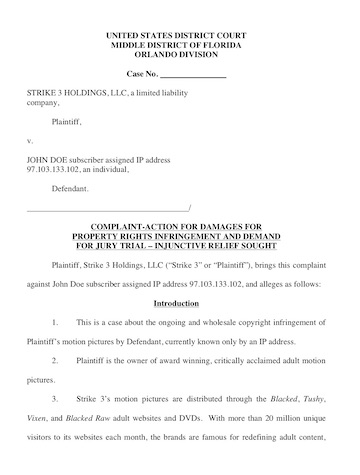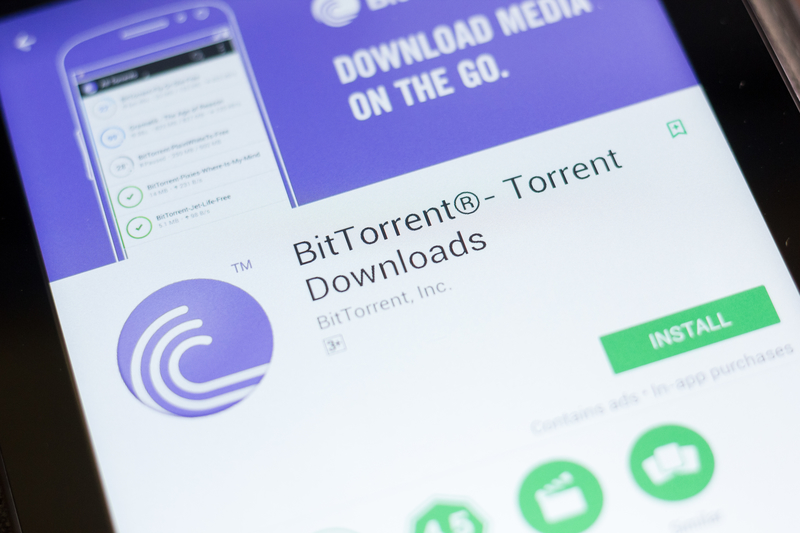Who is Strike 3 Holdings, LLC?
Strike 3 Holdings, LLC is a publisher of pornography videos it makes available through its Blacked, Tushy, Vixen, and Blacked Raw websites. It has been filing copyright-infringement lawsuits for the alleged downloading of these videos via the BitTorrent protocol.
Since September 2017, Strike 3 Holdings, LLC has filed 2,810 lawsuits throughout the country. The lawsuits started in other states, first New York, Connecticut, and Michigan. Last summer, it entered courts in Florida and filed multiple suits through October, all in the Southern District of Florida. Last month, however, was Strike 3 Holdings, LLC’s debut in the Middle District of Florida.
Strike 3 Holding’s foray into Florida is breaking a long pause of pornography BitTorrent cases in Florida, which break I wrote about in December 2016.
What happens with these Strike 3 Holdings lawsuits?
The lawsuits all follow the same pattern — and it is one we have seen before among previous BitTorrent plaintiffs who filed suit in Florida by various attorneys. The lawsuit is filed against a “JOHN DOE subscriber assigned IP address [whatever].” Almost all the Strike 3 Holdings lawsuits appear identical, with the exception of the IP address and the alleged list of downloads.

Similar to previous suits filed by fellow pornographer Malibu Media, LLC, lawsuits filed by Strike 3 Holdings allege that multiple x-rated films were downloaded. For example, in Case No. 6:19-cv-00473-GAP-DCI (filed March 11, 2019), it alleges a total of 96 films were downloaded from IP address 97.103.133.102, which it has narrowed down to a Spectrum account in Melbourne, Florida. This is a higher number of downloads than many of Malibu Media’s lawsuits alleged.
Why does Strike 3 Holdings list so many videos?
The reason Strike 3 Holdings, LLC accuses the John Doe of so double-digit downloads is because it can claim statutory damages for each individual download — assuming that each download is a separate motion picture work and the copyright for that work was registered with the U.S. Copyright Office prior to the download. (The plaintiff will consistently refer to the downloads as “infringements,” but we don’t fall for that, because that’s a legal conclusion. So we simply refer to them as “alleged downloads.”)
By claiming statutory damages of $750 or more per download, Strike 3 Holdings can allege that the downloader is liable for — in the case of the 96 videos — $76,000 or more.
Can’t I just file for bankruptcy?
BitTorrent plaintiffs might be the first to tell you (in their letters demanding a settlement sum) that copyright infringement is not necessarily dischargeable through bankruptcy. However, don’t get too caught up in the damages it is claiming. If it hasn’t been awarded a judgment against you, it cannot attempt to collect against you. First, it has to prove its case. That doesn’t mean you shouldn’t treat it seriously — you should, as this is a serious matter — however, don’t assume it’s the end of the world.
How does Strike Holdings, LLC get your personal information?
Eventually, the plaintiff (Strike 3 Holdings, LLC) files a motion for leave to file a third-party subpoena. The reason does this is because, normally, in federal litigation, a plaintiff cannot initiate discovery until it has served and met with the defendant. But in BitTorrent cases, the plaintiff does not know who the alleged downloader is; it only has an IP address.
To make a comprehensive argument to the court, the plaintiff substantiates its motion with a lengthy legal argument and affidavits. In the recent cases, Strike 3 Holdings, LLC has provided affidavits from several people, including one of its owners, one if its employees, its “investigator” Tobias Fieser (who resides in Germany and whose name we have seen in previous cases), and a computer forensic expert in the U.S.
If Strike 3 Holdings, LLC’s motion is granted, its attorneys send a subpoena to the I.P. address’s Internet Service Provider (i.e., Spectrum), asking for the identity of the accountholder. (An I.P. address corresponds to a router, provided by an ISP.)
Here is where things get interesting. Spectrum (or whoever the ISP is) sends notice to the accountholder that it has received a subpoena. This notice usually comes in the form of a mailed envelope. Sometimes recipients discard the Spectrum subpoena, thinking it’s junk mail. It usually contains copies of the motion and sometimes other court documents. However, if you receive a letter like that, don’t throw it away!
Once the “John Doe” receives that letter, he or she can consult with an attorney to see whether any grounds might exist to file a motion to quash the subpoena (and protect his or her identity) and how to move forward. A motion to quash is rarely going to be viable, and it really depends on the unique facts of your case whether one can be filed.
What happens if Strike 3 Holdings names you in a lawsuit?
If there are no grounds to move to quash the subpoena, however, that doesn’t mean the world has ended. It just means that litigation might ensue. Lucky for you, however, litigation is what we do.
If the subpoena is not quashed, the ISP sends the plaintiff’s attorney the name and address of the accountholder. Then the plaintiff must decide what to do with that information.
Some plaintiffs send a letter to the accountholder first, while others just amend the complaint to include the accountholder’s name (or another name in the household). Once the plaintiff names the individual in the lawsuit, it will serve it with formal process: a copy of a summons and complaint via process server.
But wait, isn’t this all about pornography? Isn’t it embarrassing to be named in a federal lawsuit — public record — and accused of downloading 96 movies from websites Blacked, Tushy, Vixen, and Blacked Raw? Of course it is, and that is one reason why pornography plaintiffs are successful and keep filing these lawsuits. Many times defendants will pay an exorbitant settlement fee out of sheer embarrassment. However, for many clients, we have filed a motion to allow the defendant to proceed anonymously as a “John Doe,” and many times these motions are granted, especially in cases involving pornography. This can preserve the defendant’s anonymity, at least in the public record.
Once a defendant is served, he or she has to respond to the complaint. The response can vary depending on the unique facts of the situation. Some cases give rise to different defenses from others. The most important thing here is that the defendant must respond. Failure to respond can result in automatic default — and a judgment against you. So do treat this seriously!
Then what happens?
Litigation ensues. The plaintiff will attempt to prove its case, and the defendant will attempt to prove its defenses. During this portion of the case, it is vital to have competent legal counsel so you do not inadvertently provide data or evidence that you otherwise wouldn’t be obligated to provide, and so that you are able to also seek discovery from the plaintiff in an attempt to poke holes in their case.
All this time, the plaintiff will attempt to settle the matter by getting you, the John Doe, to pay it money. Settlement negotiations might never stop and may continue throughout the litigation.
As the case continues, any number of things can happen. Sometimes a defendant pays a settlement fee. Sometimes we are able to prove that the defendant is innocent and the plaintiff drops the case. Other times, litigation continues. Occasionally, the plaintiff gives up halfway through, when the litigation is hot and heavy. Overall, however, these cases usually do not make it to trial.
These are all generalizations, of course. While BitTorrent lawsuits tend to follow a pattern, and some things can be generalized, every case is, essentially, different, and there is always a first time for everything. So it is impossible to really predict exactly what will happen in your case. That said, when we take on representation of a defendant in a BitTorrent case, we take the representation seriously and provide the best defense we are able to do.
Can we help defend your Strike 3 Lawsuit?
When BitTorrent cases were first filed in the Middle District of Florida, Attorney Conlin began to devote a significant portion of her practice to that special niche —defense only — throughout the federal courts in Florida. Ms. Conlin consequently became one of a very small handful of attorneys in the state who regularly practiced in the area of BitTorrent defense and one of the most experienced BitTorrent litigation defense attorneys in the country. Attorney Conlin has represented more than 200 defendants in BiTorrent cases, including at least 70 sued by Malibu Media, LLC.
If you would like to consult with Attorney Conlin about your matter, you can call our office at 407-965-5519, schedule a telephone consultation with her at this link, or send us an email.




Leave a Reply